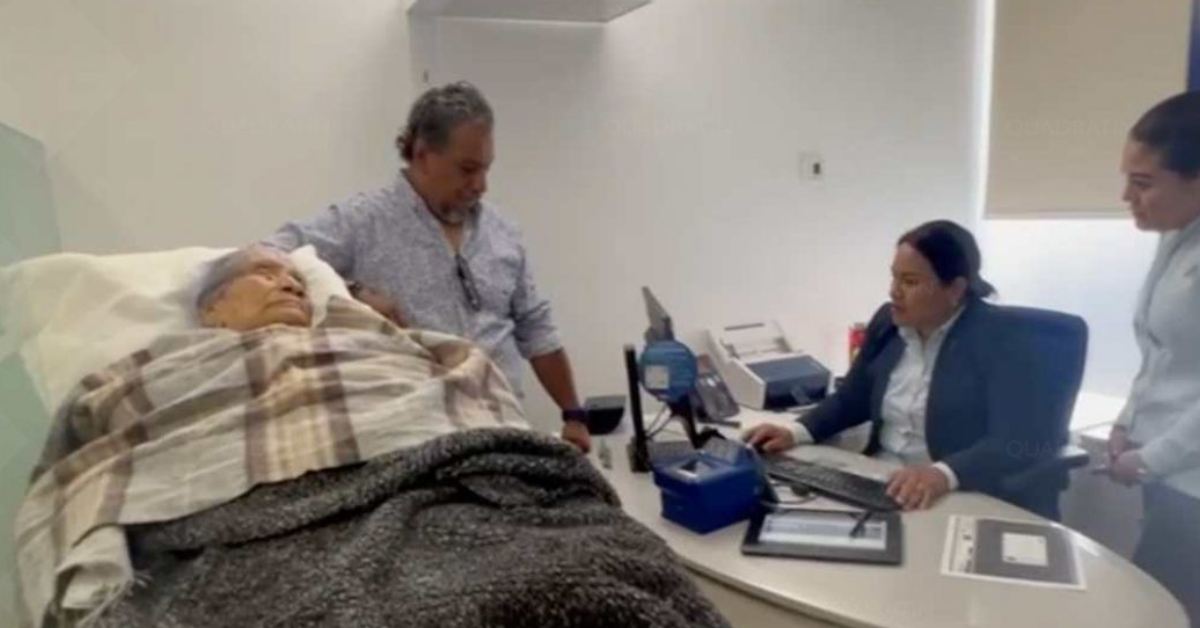A 96-year-old ISSSTE pensioner in Oaxaca was carried on a stretcher to a BBVA branch after biometric ID failed. Her family has filed complaints with CNDH, DDHPO, and Condusef.
In a disturbing display of institutional rigidity, a 96-year-old pensioner, bedridden and immobile, was forced to be carried on a stretcher before a bank executive in Oaxaca to verify her identity after the institution’s biometric system failed to recognize her. The incident, which took place at the Bancomer BBVA branch in the Reforma neighborhood, has prompted the family to lodge formal complaints with the National Human Rights Commission (CNDH), the Ombudsman’s Office of the People of Oaxaca (DDHPO), and the National Commission for the Protection and Defense of Users of Financial Services (Condusef).
Fidelia Vásquez Nuño, one of the oldest ISSSTE pensioners in the region, has been unable to collect her monthly pension for the last six months. Despite her son and legal guardian, Gilberto Ayala, presenting multiple official documents — including her birth certificate, CURP, and ISSSTE registration credentials — BBVA has consistently refused to release the funds. According to Ayala, the branch manager insisted on a series of additional requirements before validating her identity in the bank’s biometric application.
“The amount of paperwork and bureaucratic hurdles we’ve faced is nothing short of a nightmare,” Ayala explained. “My mother is not gravely ill, but at 96 years old, her mobility is severely limited. We had no choice but to transport her in her hospital bed, even hiring an ambulance, to satisfy the bank’s demands. Yet, even when she arrived on a stretcher, they continued to delay her pension.”
Ayala described how the bank’s biometric system failed to recognize his mother’s facial features, attributing the error to the natural changes that accompany advanced age. “They have no consideration for the fact that her face has changed over time,” he lamented. “They keep sending us from one office to another, but no one can give a clear reason why they won’t release the payment.”
Fidelia’s daughter, Ernestina Ayala, announced that the family will pursue a formal complaint against BBVA’s Reforma branch for the “undignified, dehumanizing treatment” meted out to her mother. She criticized the bank’s refusal to adapt its identification protocols for vulnerable clients. “Even after physically bringing my mother in on a stretcher, they persisted in erecting obstacles rather than providing a resolution,” Ernestina stated. “It’s not just about paperwork; it’s about respect and human dignity.”
Financial services in Mexico are regulated by Condusef, which is tasked with protecting users from unfair practices by banks and other financial institutions. The Ayala family’s complaint highlights an ongoing tension between technological advancement — such as biometric identification — and the need for flexible, humane procedures when serving elderly or disabled clients. The National Human Rights Commission and the DDHPO will now investigate whether BBVA’s actions violated the pensioner’s fundamental rights to nondiscrimination and access to social security benefits.
ISSSTE (Instituto de Seguridad y Servicios Sociales de los Trabajadores del Estado) is responsible for administering pensions to public-sector retirees like Fidelia. Under current regulations, pension payments may not be suspended unjustly, and banks are required to process pension disbursements in accordance with documented proof of identity. Gilberto Ayala insists that all official documents proving his mother’s status as an ISSSTE beneficiary were presented, rendering the bank’s biometric failure moot.
For elderly citizens, biometric systems can pose significant challenges. Facial recognition software is typically trained on datasets populated by younger, middle-aged faces, making older individuals more susceptible to false negatives. Disability rights advocates argue that financial institutions must implement fallback identification methods — such as manual verification or the use of guardian documentation — to ensure that vulnerable clients are not denied essential services.
Human rights organizations have taken a keen interest in the Ayala family’s case. The CNDH has previously ruled in favor of elderly complainants when banks adhered too strictly to automated processes without adequate human oversight. In 2023, CNDH issued recommendations to Mexico’s banking sector to adopt more inclusive identification protocols for clients with disabilities or those of advanced age. The Ayala family hopes this latest complaint will spur systemic change within BBVA and across the financial industry.
Meanwhile, Condusef’s role in adjudicating consumer complaints will be critical. The commission may impose fines or require BBVA to revise its biometric procedures if it finds that the bank violated financial service regulations. “Banks must balance technological innovation with accessibility,” said a Condusef representative. “We will evaluate whether this institution failed in its duty to treat all clients — especially the elderly and disabled — with the respect and consideration they deserve.”
Local human rights advocates are also rallying behind the Ayala family. The Ombudsman’s Office in Oaxaca has pledged to investigate whether the bank’s requirements contravene state-level protections for the elderly. “No one should be forced to undergo physical or emotional hardship to access their lawful pension,” said an official from the DDHPO. “We will determine if BBVA’s actions constitute discrimination or an abuse of authority.”
As the investigation unfolds, the Ayala family continues to push for immediate release of the payments owed to Fidelia. “My mother deserves her pension,” Ernestina insisted. “She paid into this system her entire life. It’s unconscionable that she must beg for a benefit she has lawfully earned.”
The case raises broader questions about the intersection of technology, human rights, and social welfare in Mexico. While biometric identification promises greater security and efficiency, it must not come at the expense of fundamental human dignity. Legislators and regulators may need to revisit guidelines to ensure that elderly and disabled citizens can access financial services without undue barriers.
For now, all eyes are on BBVA’s Reforma branch, which will be under scrutiny by three separate oversight bodies. The outcome of these investigations may set a precedent for how banks handle biometric failures involving vulnerable populations. Until then, a 96-year-old pensioner and her family remain embroiled in a bureaucratic battle that highlights the human cost of rigid technological systems.
A 96-year-old ISSSTE pensioner in Oaxaca was carried on a stretcher to a BBVA branch after biometric ID failed. Her . . .












